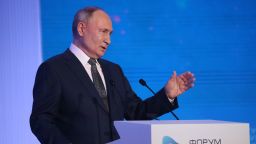Editor’s Note: Daniel Treisman is a professor of political science at the University of California, Los Angeles, and the co-author, with Sergei Guriev, of “Spin Dictators: The Changing Face of Tyranny in the 21st?Century.” The views expressed in this commentary are his. View more opinions at CNN.?
People used to ask Alexey Navalny why, knowing the risks, he chose to go back to Russia in 2021 after he was poisoned with a rare?nerve agent originally developed in the?Soviet Union?and almost died.?Rather than return to face almost certain imprisonment, he could have stayed abroad to lead the resistance to Putin from the West.

His answer was simple:?“Russia is my country, Moscow is my city, and I miss them.” His death in an Arctic penal colony prison, announced by the Russian prison service on Friday and confirmed by Navalny’s spokesperson on Saturday, shows the sordid depths to which Putin has dragged that country.
In his courageous and too short life,?Navalny became a symbol of hope for the younger generations of his compatriots. Understated, witty, often self-mocking, he had the style and presence to inspire a broad cross-section of followers.
His team’s?drone?videos?of the pleasure palaces?of Kremlin insiders?made it impossible for anyone to deny the?accusations of?corruption at the regime’s core.?(Except, that is, for Kremlin spokesmen, who dismissed Navalny’s claims as “propaganda rants” and “a bunch of nonsense.”) Navalny?led?mass protests against corruption on multiple occasions.
He never gave up on the prospect of what he called “the beautiful Russia of the future.”
Putin, by contrast, seems fixated on a partly imaginary Russia of the past. As his recent interview with Tucker Carlson showed, the Russian president’s mind these days is on the medieval exploits of Yaroslav the Wise and assorted Viking?chieftains.
He shows little concern for the millions of younger Russians whose lives have been torn apart by the Kremlin’s brutal power plays. Many are now in exile or fear conscription to the Ukrainian front lines.?Hundreds?braved police on Friday to honor Navalny by placing flowers at memorials dedicated to the victims of past repression.
Over the years, Navalny’s treatment by the Kremlin has traced the dismal evolution of Putin’s regime. Initially, insiders sought to ignore or ridicule him. Putin went to great lengths to avoid saying his name in public.
Rather than attack Navalny as a political rival, the authorities peddled a concocted image of Navalny as a petty swindler. Criminal cases accused him of defrauding a cosmetics company?and — almost comically — of?illegal elk hunting.
At one point, a prosecutor even?intervened?to keep Navalny?out?of jail.?Instead, they used revolving door?detentions, lasting two to three weeks at a time, to isolate him when protests were scheduled.?
But, later, as Putin grew more belligerent and reliant on old security service colleagues, the approach hardened. In 2020, Federal Security Service (FSB) officers poisoned Navalny by planting the nerve agent Novichok in his underpants, CNN reported.?(Putin denied FSB involvement, saying that if agents had wanted to poison the activist “they would have, most likely, carried it through.”)?After Navalny survived and returned to Russia, the authorities piled on a series of more weighty prosecutions. The latest, for “extremism,” resulted in a 19-year sentence.
Navalny’s death will leave a gaping hole at the center of Russia’s opposition movement, already fragmented and scattered across the globe. It might prompt remaining anti-Putin activists to unite, but that’s unlikely.
Within Russia, it raises questions about the presidential election scheduled in mid-March.?Navalny had urged Russians to vote strategically, supporting any candidate other than Putin. His death could amplify that message.
The Kremlin already seems rattled by the unexpected popularity of a liberal politician and war critic, Boris Nadezhdin.?Initially unconcerned about his candidacy, the authorities recently blocked Nadezhdin from running.
The official election results are almost certain to show an overwhelming Putin victory. But the bigger the act of fraud necessary to achieve that victory, the harder it will be to hide — and the greater the risk of public anger. In 2011, blatant?ballot rigging?in Moscow triggered a wave of mass protests.
To Western leaders who have called on Russia to respect human rights, Navalny’s death is an open affront. President Joe Biden in 2021 warned Putin of “devastating” consequences if the activist were to die in jail.?On Friday, he blamed the death on “Putin and his thugs” without saying whether the US would take further measures.
A first step would be to commit to hold all those involved in Navalny’s persecution — from Kremlin aides to prison guards — accountable under international and humanitarian law. After the lawyer Sergei Magnitsky, another brave Russian, died in one of Putin’s jails in 2009, the US and Europe passed?laws?to sanction the perpetrators.?This legislation should be enforced and broadened. At the same time, Western governments must use all leverage they have to help Westerners wrongfully imprisoned in Russia.
Western leaders must?publicly demonstrate their commitment to liberal values by attending memorial services for Navalny around the world. Like the Russian invasion of Ukraine in 2022, this is a moment to show unity. At a time of political cynicism, those who believe in democracy and human rights need to stand up and be counted.
Get Our Free Weekly Newsletter
- Sign up for CNN Opinion’s newsletter
- Join us on Twitter and Facebook
In the US, the best tribute to Navalny would be for Republicans in the House of Representatives to quickly pass the aid that Ukraine desperately needs to keep fighting Russia’s dictator.?President Biden, in his remarks on Friday, urged Congress to act fast, saying a failure to supply Ukraine would go down in the pages of history: “We have to help now.”
For a “beautiful Russia of the future” to emerge in coming years, Putin must lose the war he started. Navalny understood this. A year ago, while he was serving his sentence, Navalny called for Russia to withdraw from Ukraine — and pay it compensation — with posts from his Twitter account.?Putin wanted to “turn all Russian citizens into his accomplices,” Navalny wrote, but instead the lack of volunteers had forced him to turn to convicts.
Navalny’s example and ultimate sacrifice remind us that there have always been — and still are — Russians who believe in decency and freedom for all. Now more than ever, we need to show them that they are not alone.


